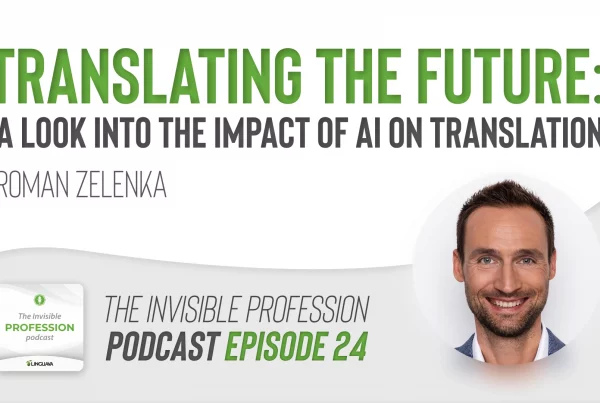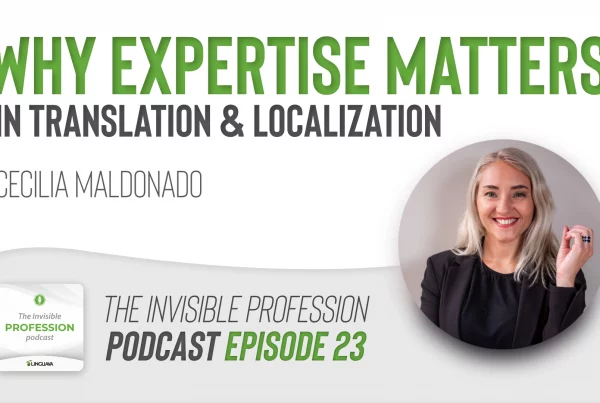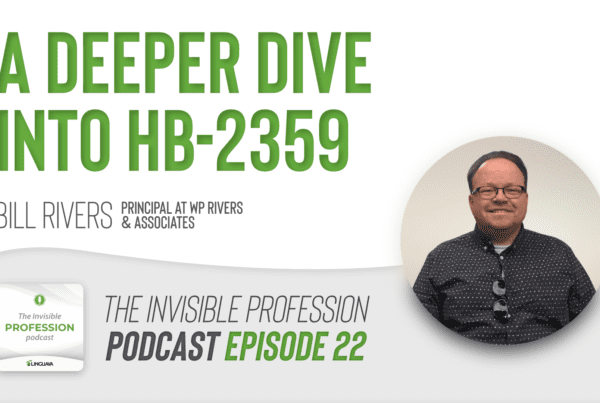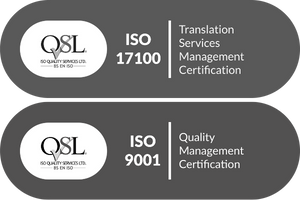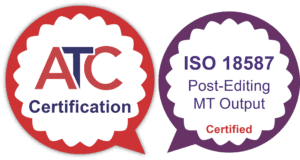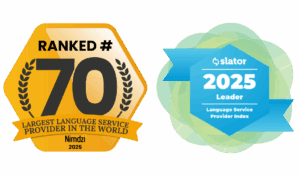Mary Soots, Oregon Health Care Interpreters Association Director of Education Programs, takes a deep dive into what it takes to make medical interpreting a lasting and rewarding career.
Mary Soots is an Anthropologist, a social researcher and policy analyst, and an Oregon Certified Health Care Interpreter (Spanish). She is an Adjunct Professor of Anthropology at Portland State University, specializing in the culture of Latin America. She has worked with the Hispanic community in Oregon for over 40 years which helps to inform her interpreting work. Until COVID, she also worked in Research and Evaluation at the Oregon Museum of Science and Industry (OMSI).
Mary is the Director of Education Programs for the Oregon Health Care Interpreters Association (OHCIA), developing the curriculum for the 60-hour Health Care Interpreter training program required for Qualification or Certification credentials for spoken and sign languages. She oversees the continuing education program expanding HCI skills and knowledge. Mary also provides the instruction along with various continuing education classes including Cultural Awareness for interpreters and other health care professions.
Born in Mexico and raised in the Midwest, Mary’s bicultural background provides depth to her work by interpreting both the meaning of the message and the cultural context in which it exists. Her goal is to create bridges of understanding across cultures. Mary holds a Master of Arts degree in Anthropology from Portland State University, Bachelor of Arts degrees in International Studies and Anthropology, as well as Minor Degrees in Spanish and in Geography.
Listen to our podcast on all your favorite platforms here.
Connect with us on LinkedIn
Follow us on social media:
Facebook
If you share a passion for communication and service and and are interested in a medical interpreting career, take a look at joining our team! We provide support and training whether you are just getting started or have been interpreting for years.
At Linguava, we are dedicated to reducing communication barriers and providing equity to all members of our community through language access services.
If you are interested in learning more about incorporating language access into your business or would like to book a training session, contact us today.
Ep.16 Mary Soots – how to make medical interpreting your career
Welcome to the Linguava podcast The Invisible Profession. We give you tools, tips, and resources in medical interpretation and translation that help bring to life our profession and ultimately help improve health outcomes with the Limited English proficient and Deaf and Hard of Hearing community.
David: Welcome everyone to the invisible profession podcast. We do this podcast so that we can help expand the interpretation, translation, profession, share ideas, tools, tips, and resources. Hopefully we’re adding value to you and the interpreter translator community to ultimately improve health outcomes for the Limited English Proficient and Deaf and Hard of Hearing communities.
And today I’m with a dear friend and, uh, someone who’s a real leader in our industry. Mary Soots. And just to give you a little bit of information on, uh, on Mary, Mary is an anthropologist, she’s a social researcher and policy analyst, and she’s also a Oregon state medical interpreter, certified medical interpreter.
She’s an adjunct professor of anthropology at PSU Portland state university specializing in the culture of Latin America. She’s worked with this band community for over 40 years, um, doing research, which helps inform her interpretation work. And she’s also the director of education programs for the Oregon Healthcare Interpreters Association, or as many of us know it, OHCIA developing the curriculum for the 60 hour healthcare interpreter training that is required for all qualified and certified interpreters have spoken in sign language. She oversees the continuing education program. As well there, she provides instruction along with various continuing education classes, including cultural awareness for interpreters and other healthcare professions.
So very excited to have you joining today on the show. Welcome Mary Soots.
Mary: Thank you, David. Great to be here.
David: Great to have you have you with us this morning, and it is a great to see you. It’s been been so long since we’ve, I’ve been able to, to see you in person or even see you on video. So that’s great to see you.
Mary: Yeah, well, back when we had real life conferences, I think.
David: Right, that would, that would have been the last one the OHCA conference. So Mary, a question for you. A lot of us know about the OHCA Oregon healthcare interpreters association. And some, some people listening here might not know yet about the OCA.
And so in your own words, we can read the mission statement on the website, but in your own words, what is the, what is the mission and the purpose of OHCA?
Mary: OHCA is an organization that was started. Uh, by working interpreters and it was created for working interpreters in order to meet what had at the time that it was started, um, the, what had been new red legislation requiring that interpreters, uh, get credentialed and, and helping them find the means to do that and to, uh, help us to um, make it an affordable way for everybody to access the training and not only the training, but get support to make sure too that we are successful as
and as professional um, individuals, how to make a living at being an interpreter, how to make a viable, economic, uh, decisions about being interpreters.
So helping people, uh, basically strive to be the best that they can, uh, that they can in their field.
David: Yeah, no it’s. And when you guys have been doing such a phenomenal job at that and doing the really leading in the, the interpreter training field and doing right now, I think you mentioned doing 50 students, uh, 50 students attending your trainings per course and doing for four courses right now, online, uh, four courses a year. So I, I applaud you and commend you for the, for the work that you guys are putting in there. And, and so you’re in, you’re, you’re leading the, or the director of education program.
So you’re leading the, the trainings and you’re the, the lead trainer and teacher in those courses is that right?.
Yes. It’s
Mary: um, it was kind of a funny thing. When I first started, I did not plan on being they instructor. I said, I already have like five other jobs. And, um, so I, I said, I will help you to be the person who sets the curriculum, who sets up the classes, who hires the inspectors, who make sure that, uh, every, all the content is according to OHA policy, et cetera.
And, um, And then at one point I was asked to set up the online training program and I thought the only way that I can do the online training program is if I actually interact with the students and do the training one time, just so that I can see how it flows. Um, and that was my intention at the time.
But then to, uh, our goal was to create an online training program that was. Uh, like a new type of a new way of training the interpreters. And so it took me about a year to figure out how to use the, or how to create a curriculum when I first started. And then it took me about another year to figure out how to adapt that curriculum to an online training.
It was our goal to help, uh, interpreters in the rest of the state, get their, uh, training. And so we created a, an online training program and unfortunately the only people who were. Uh, who had the skills who were certified interpreters as required and who also were experienced educators and who had the technological knowledge to do the online training were, uh, Heidi Small to, uh, rest in peace, just passed away recently. And, uh, and myself and Heidi was already teaching a class online at, uh, through another college. And so she was not available. So it sort of left me holding the ball, doing the online training. And so since COVID started, I have, uh, I have been the inspector for the whole course and the online training.
And it’s a great, I have to say. I love it.
David: Yeah. Well, I have to say too that from the interpreters I, I speak with, I heard nothing, but. Raving fan reviews about, about you and your teaching style and the course itself. So for those who are looking at taking a interpreter training course, I would highly recommend looking at OCA is a course.
And you can find information about their course on online and be able to register for the next upcoming upcoming course. You talked about something very interesting that I’ve been talking about a lot lately, which is how to make interpreting a career. Interpretation for those of us who work as interpreters, whether full-time, or part-time the majority that I talked to do it because we love it because we’re passionate about it.
And simultaneously we’re trying to figure out, okay, how can I do this as a, as a career? How do you answer that question for someone who’s thinking about getting started? How do I make interpretations? Uh, career. And what, what should someone be thinking about when they’re getting started?
Mary: Well, you know, that’s a really great question and I know that that is a big question for us as a healthcare interpreters.
Um, what I see really there’s two types of individuals who are interpreters. There are individuals for whom interpreting is. Great way to have a flexible job, a flexible part-time jobs, people who are students who work while they’re on vacation, or they interpret when they’re not heavily into finals week or whatever.
And so for them, it’s very convenient of. Mothers who have children who are home sometimes and not home other times, and people who might have other part-time jobs, uh, but not, uh, who are looking for a flexible job. So that’s one type of individual, uh, interpreter for whom, you know, having a flexible, uh, you know, job is more important than having a very high paying job.
The rest of us, who, for whom interpreting is, and I also have say, have other careers. So interpreting is a part-time job for me. But for those of us who have, uh, interpreting as a full-time career, then what we need to do. We are far, far behind and the, um, in our profession in comparison to court interpreters or, uh, ASL interpreters who have had years of advocacy in legislation to make sure that the credentialed interpreters are paid a very decent income. And so for us to be able to advance as a profession, we need to bring ourselves also to the same level of, of interpretation as the court interpreters, as the ASL interpreters. And we need to stand up for our rights. A lot of of interpreters are who are immigrants feel that they don’t have a voice and nobody is advocating for them. And the reality is that when OHCA started one of, there were, there had been a couple of attempts to start, uh, organizations for healthcare interpreters here in Oregon. Um, that when we started about 11 years ago, we were the first successful organization.
And who said, you know what? We have to advocate for each other. We’re all in this together. And we need to make sure that interpreters are. Uh, you know, are brought up to a higher level of professionalism. And, uh, now I’m thrilled to see that there’s other organizations and we are all working to advance our profession.
So, uh, one of the things that we need to do as interpreters is understand our own battle. A lot of people, especially those immigrants, especially indigenous immigrants, think of themselves as they’ve always been put down in their own countries and here, and there’s not large populations. And so they feel like they’re under, but they’re the underdogs.
But the reality is we need to understand the value that those individuals bring to a career where there’s a high demand. And, um, and then start saying, you know what, this is what. And then bring that level up. And so we’re working to create a training program for all interpreters, so that all, uh, you know, all ships rise together and that we can become more successful.
And so by understanding that this is what we’re striving to do, uh, we can all work together to achieve that. We also need to understand opportunities are no longer just here in Portland. If this is where you live or just out in Prineville, if that’s where you live, you need to think about, we have remote interpreting that wasn’t available 10 years ago, and we want to create not just the best interpreters here for the state of Oregon.
We want to make the best interpreters in the country. And then in the world, we want to have the best trained interpreters in the world.
David: Yeah. One of the things is as, as a 1099 contractor, as, as we know you are your own business owner, it is, it is your, you are running your business as a 1099 contractor. And so you, you mentioned some of the, the cord interpreters and ASL interpreters that are a little bit farther ahead, as far as structure and certain policies the way things are running. So talking about spoken language interpreters as contractors, one of the things that that I think is really important to kind of piggyback on what you said was that as a contractor, you are in charge of your business, which means you’re also in charge of setting your own rate.
So that’s a real big topic that doesn’t get a whole lot of traction. We’re actually doing it, doing a webinar coming up this week. That’s going to be talking a lot about how to run your own business as a contractor and rates are going to be a big part of it. The, the, the rate piece, I still hear interpreters often say, well, I’ve been working at this agency for five or six years, and they’ve never given me a raise.
And so with that, I want the, that kills me because I want to politely lean in and say, you can give yourself a raise. You can give, you set your own rates. It’s not really a raise. It’s more just, these are my rates this year, right? Competitive rate. Right? So you, if you’re just charging way, way, way up here, it’s going to be difficult for a foreign agency to probably agree to those rates, but it should be a competitive rate and it should be, you should be able to give yourself an adjusted rate each, each year that is competitive, but that, that is steadily increasing. Um, and then the agency, the language service provider that you might work with of course, has to agree to that. Right. And if they don’t agree to it, then you can either choose to work with them or not, and you could go, go work, work somewhere else.
And so I think that’s a really important piece that I want to help empower interpreters with as well as that you like you’ve mentioned, interpreters are bringing a lot of, a lot of value. It is a partnership, and I want to be able to help and see interpreters, understand their, their value and worth in this, uh, in this.
Mary: You’re very right, David. Um, when I first started in the interpreting world, it was a profession I didn’t know, uh, on a professional level. Right. So I didn’t know that I had the ability to negotiate. And when I started, I felt that I was, I knew that I was a contractor, but I felt that I was contracted by one agent.
I didn’t understand that I could actually contract with more than one agency at a time. And so that agency fortunately kept me busy all day long. I mean, you know, we, Spanish interpreters are so much more, um, privileged than the other the languages of interpreters, of law, of languages, of lesser diffusion, because we have work coming at us that we’re turning away constantly.
And so when I first started interpreting, I was interpreting for an agency that was paying me $18 an hour. And, um, then the state required certification and I went ahead and I got certified right away after that other agencies started approaching me and they said, you know what? We’ll pay you. Um, I was fortunate in that, in the training program that I attended, you came and spoke to our class and I said, that’s the agency I want to go into Linguava is the only agency I ever approached.
Everybody else has approached me, or I’ve been referred to another agency. And so it’s, um, it’s something that you, as an interpreter have the ability to say, you know what? I can choose to work for this agency and, you know, a lower rate, or if that agency is not willing or able, sometimes they’re not able to, because of the contracts that they have with their providers, if they’re not able to give you a higher rate, then.
You know, you have responsibility to, to become a better interpreter so that you can take the higher level of skills and then transfer them to other agencies or other opportunities. If you become a simultaneous interpreter, you’re going to get paid a premium. If you interpret, you know, certain type of appointments you get might get paid more.
So, you know, you can choose the agencies who you work for and you can say, well, you know what, I’m going to charge you $150 an hour. And then you can just sit home and wait for that phone call to come but it’s probably never going to come.
David: And as you mentioned, as you mentioned earlier about all, all ships rising, the more, the more that you have on your, on your resume, as far as being a qualified or certified medical interpreter and being compliant and having all your vaccinations and taking certain, certain courses or things that you’ve, you’ve done, you’re adding to yourself professionally, you’re making yourself a better interpreter and also you’re making yourself more desirable in the market space so that you can get more.
Regardless of the language that you’re interpreting for. Um, and it gives you more, more power as well. When, when negotiating, it gives you more negotiational, uh, leverage there. Exactly. Exactly. Like you mentioned, it’s very different looking at, let’s say Spanish or Russian or Vietnamese Cantonese, Mandarin.
Because there is so much more volume right there. And for languages of lesser diffusion, there are lots of opportunities to be able. If you’re wanting to do this full time, being able to do video relay interpretation or over the phone interpretation, where, where you can work with agencies that might be here locally, that might be another other places.
Uh, and as a contractor, you’re able to work with. With countless, uh, with countless agencies, as long as you can, you, you can manage, manage that. Right? So that’s something as well that I think interpreters can, can really think outside the box and be innovative when it comes to the opportunities that they, they want to take advantage of, especially in our new remote virtual world, that we’re definitely in.
Mary: Yes. We’re. We have to stop thinking inside that little tiny box of, you know, my, the place where I live is where I interpret , that’s no longer the case. What I tell my students is that if you are a French interpreter, you’re probably not going to get a lot of work here in Oregon, but you know, what, what of your interpreting for an agency in Quebec or what happens if you are interpreting for English speakers in France?
Right. So don’t limit yourself to thinking that you have to only interpret for the people who live in the area where you live. You have to think about what about the people in your home country who might need interpretation into English, right. You know, outside of that box.
David: In your trainings, Mary, you know, you’ve trained so many different, different interpreters. Uh, what are the most common questions that you get on a typical basis from, from interpreters about the role of interpretation or about the profession?
Mary: You know what David, I have to tell you that the most misunderstood thing in my experience has been the process of getting certified by the state board.
Um, there, uh, no matter how many times I try to explain it, and then I even bring in the Oregon Health Authority to explain it. And then people, and I send information, I posted on the festival. People always email us and say, you know what? I’m I want to apply for it to be a organ interpreter. There is confusion between our name OHCIA, and the OHA, the Oregon Health Authority, the Oregon Health Authority is the government agency that runs the healthcare interpreter program.
They require that the interpreters have a training and OHCIA is one of the approved trainers. We have trained about 90% of the interpreters in the state of Oregon. I’m proud to say. And, uh, but we are only one step in this, in the road towards getting certified by OHA. There are other requirements that have to be met.
And I just can’t stress enough that once you’ve taken our class and you have received your, your certificate of completion saying you’ve taken our class, that doesn’t make you a national sort of a certified interpreter, and it doesn’t make you an Oregon certified interpreter. There are further steps that need to be taken.
David: All right. So it’s just a, just a part. If we can cross off the 60 hour training piece and then you still have, have more, more components as well. So we’ll definitely leave some, some links for resources there in case there’s individuals that have more, more questions. Cause I, I, I would agree with you. I, I hear a lot of those questions as well, that that’s still can be confusing for a lot of people.
So we want to bring that clarity as much as, as much as we can. Um, and. As an interpreter, you know, we face so many different scenarios when we’re in the room interpreting. And a question question that came up, came up recently that I’d love to love to get your take on as well. So many different, different scenarios that that can take place.
But the, the question is what does an interpreter do when they witnessed discrimination during an interpretation appointment?
Mary: Well, the code of ethics, uh, for interpreters, it very clearly establishes that one of the, uh, one of the roles of the interpreter is to be an advocate. And I always tell my students think of the roles of the interpreter being an inverted triangle, where the, the largest widest, uh, area is where you are a conduit taking language and converting it and delivering it. And you might be a clarifier. You might be some other things in the very tip of the triangle. The very smallest amount of work that you do is to be an advocate. And there are times that I have actually had the advocate. I can count on one hand, but if you see an actual violation of the civil rights act where a person is being discriminated against, especially by a provider.
Then it is your obligation. It is your duty to make sure that you interview. And I have, you know, I’m sorry to say. I’ve also seen cases of, of discrimination by interpreters. And I did intervene in that situation, but the most common of course, would be where you would witness a, uh, a situation where a patient is being denied services or where their health is being put at risk.
And in that situation, um, depending on whether it’s. It’s a hospital setting. You would then contact, uh, or you would either direct the patient to contact or you would help them interpret while they contact, uh, the, the, you know, someone in administration to make sure that they are informed of the situation so that they can be remedied because the, if you ignore it, the problem isn’t going to go away on.
And another person will be discriminated against. So when you’re doing a favor of advocating for someone, when their civil rights have been violated, you’re also doing that same service for other individuals as well.
David: That’s so true unfortunately witnessed as an interpreter as well, very few times, but I have witnessed some discrimination, um, during, during an appointment from a, from a provider and I, and I did, I did speak up, uh, and, and report that to the, to that, to that clinic. Um, and so, yeah, it’s important. That as interpreters we, we know that we do have a code of ethics and one of those scenarios, like you said, that doesn’t happen very often, but we can play the role of an advocate for when, when needed, um, as a, from your perspective, as well as training so many different interpreters, what is, what is that one thing that separates the good interpreters from, from the great interpreter?
Mary: Well, it separates the good interpreters from the, uh, for the great interpreters would be the passion, the passion. There are those individuals who interpret because it’s an act of love for their communities. It’s an act of service to the individuals that, uh, that know who. Uh, that they know need the interpreter.
It’s probably people like, uh, you know, people like our executive director, Susie Malano, whose passion cannot be understated, who, uh, has experienced the, uh, the, some of the trials and tribulations that, uh, that our LEPs go through the limited English. Uh, individuals who are immigrants, who may not know the language, who may not know the healthcare system, who may not understand, uh, what is happening to them.
And who may not have the resources to be able to, uh, to get what they need. And so those individuals who can be empathetic, be compassionate are, uh, and who will, are willing to go beyond just going in and go and blah, blah, blah, blah, blah, blah, blah, blah, blah, and then walking out and going, all right. You know, what is it time for, you know, uh, for cocktails.
Those are the individuals who really are going to go the extra mile for the interpreters are in, who are going to make sure that they are improving themselves so that they can help the LEPs.
David: Yeah, it’s all about, yeah. Every, like you mentioned earlier, all, all ships rising, rising together, and taking, taking that ownership and a, an initiative in order to, uh, in order to do so and Mary if you could leave one, one message to the interpreter community, what would that message be?
Mary: Gosh David I would say, um, I, you know, it’s a, it’s a devil kind of fork thing. Uh, don’t be mediocre, just like I was saying, you know, be the best we want to make Oregon interpreters the very best in the world. And so be the best that you can be.
You’re going to make us all as a profession, be better and be able to improve ourselves. So. Um, the other part of that is never underestimate yourself, never understate underestimate the fact that bilingualism is a privilege. It’s the opportunity for you to bridge cultures between your source language and your target language communities.
And so, uh, don’t undervalue yourself and don’t undervalue your community either make sure that you understand how, how important, you know, Yes. No, I love, love that. So, so, so important. And it’s on, it’s on all of us there’s to continue to daily make that, make that progress. Yes. And you know, our end goal really is to make sure that we provide the best health care for those individuals who we are speaking for, whose voice we are being.
And so if we, if we improve ourselves, We are improving their health outcomes.
David: Yep. That’s that’s ultimately what, that’s what it’s all about. Right? That’s the journey that we’re all on. We’re here. So that the end of all of this, what, why, why are we here? What, uh, what’s the end result of us showing up? And doing a successful job as an interpreter is that someone’s patient experience is going to be improved.
Someone’s going to have improved health outcomes as a, as a by-product and that’s, that’s worth it. That’s worth more than more than any in anything. And it’s on all of us to, to raise, raise the bar, raise the standards of excellence so that we can make sure that that, that, that happens and that everyone’s getting the language access that they need, that they have the right to, to have.
Mary: Right. It takes a, if, you know, it takes a village, as they say, we have to understand that we are all in this together. Um, not only the healthcare interpreters, but the agencies, the state, you know, the office of equity and inclusion so that we make sure that we are complying with, uh, the civil rights act and the CCOs and the LEPs.
Right. So we all have to work together because really in the end, it’s really looking out for each other.
David: Yeah, I love that. So for those people who want to get involved with OHCIA, what, where should they, where should they go? What are the main opportunities right now for, uh, getting involved with OHCIA.
Mary: Well, you can go to our website. OHCIA.Org. Now remember the org is because of the fact that we are a nonprofit organization. Although people think that we are a large organization, we have a board of directors, and then there’s actually three of us who are the hands-on individuals. And all of us have full-time jobs. We all have other careers, but there’s Susie Malano our executive director. There’s Jessica Palacios who just replaced it Guillermo Ortiz. Uh, as our training coordinator and there’s myself, the director of education programs and between the three of us, you know, we have to, we run a very lean and very resourceful and very adaptable organization, but there’ll be patient with us if we don’t re, uh, get back to you right away.
But we love, um, we love our interpreters and we, we depend a lot on volunteers. So for our conferences, for our training, anyone who, uh, is able to help other veterans. I’d rather volunteer to help other interpreters, get the training. Uh, please reach out to us.
David: And is there going to be a 2021 virtual conference or a conference this year?
Mary: Do we know yet at this point, at this point probably 2021 is not going to happen, but we will definitely have one in 2022.
David: Okay. All right. We’ll continue. Continue to stay tuned. And, uh, I just want to say. Thank you, Mary, for all of your hard work and efforts. Thank you, Susie malano, uh, for all your hard work as well, and, and Guillermo for helping continue to lay the foundation, uh, we’re just very grateful for all the work that you all are doing.
And like you said, there’s a, it’s a small lean team, but you’re, you’re, you’re touching a lot of lives and ultimately you are improving health outcomes. And so we’re, we’re grateful for the work that you do. It’s um, it’s really. And we’re happy to be partnered, partnered together with you and I encourage any.
Who is looking at taking interpreter training to re reach out if you’re interested in volunteerism as well. There’s always opportunities with OCA. So do connect with them on, uh, on, through their website. Or I know they have Facebook, LinkedIn, and Instagram account as well. So we’ll make sure that we’ll.
We’ll put those links here for, for anyone who’s wanting to get connected with them there. Thank you so much. It was an honor. It was a privilege and it was a lot of fun. I would get bang, bang. Buh-bye buh-bye .


